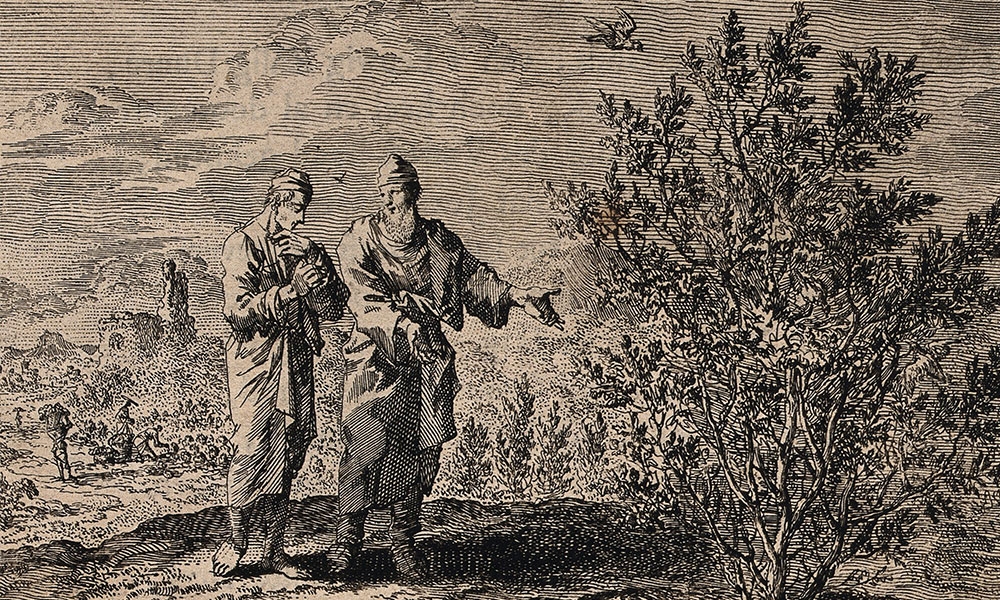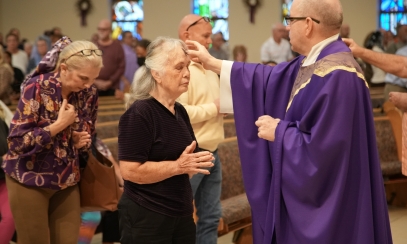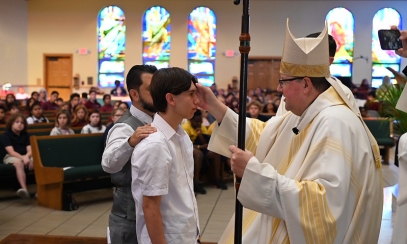
Diligence and Acedia
In the spiritual life, virtues and vices compete
In the spiritual life, virtues and vices compete
Getting your Trinity Audio player ready...In the Letter to the Hebrews, we hear these guiding words: “Let us run with endurance the race that is set before us, looking to Jesus, the founder and perfecter of our faith.” (1-2) This simple phrase speaks to the virtue of diligence in our pursuit of a deep and lasting relationship with God.
In the Letter to the Hebrews, we hear these guiding words: “Let us run with endurance the race that is set before us, looking to Jesus, the founder and perfecter of our faith.” (1-2) This simple phrase speaks to the virtue of diligence in our pursuit of a deep and lasting relationship with God.
Eyes on the prize: The kingdom of heaven
To understand the importance of diligence (and the perils of acedia, or sloth, its contrary vice), it is helpful to consider Jesus’ description of the kingdom of heaven. The kingdom of heaven is a state of communion with God. It is the state Jesus made present to his disciples during his earthly ministry.
Jesus speaks in many of his parables about the kingdom of heaven. For example, according to the Gospel of Matthew, the reign of God is like the yeast that causes the whole mass of dough to rise (13:33); like a buried treasure in a field (13:44); like the search for a fine pearl (13:45); like the field in which good wheat grows up among the weeds (13:30) and like a mustard seed (13:31).
We learn from these images that there is work that must be done in order to attain the kingdom. The yeast must be kneaded into the dough; the buried treasure and fine pearl must be uncovered; and the seed must be planted.
Furthermore, pursuing the kingdom of heaven requires a total commitment. We must sell everything to buy the field where the treasure is or to buy the pearl of great price. We must purge the weeds that separate and obscure our view of the good wheat. The Gospels make this even clearer in the story of the rich young man. “If you wish to be perfect,” Jesus counsels, “go, sell what you have and give to the poor, and you will have treasure in heaven. Then, come follow me.” (Mt 19:21)
The role of diligence in ‘going the distance’
We see, therefore, that desire for the kingdom must come first. We must be zealous for communion with God and seek it with all our heart, strength and might, for it is our greatest good. This is precisely what the virtue of diligence connotes: perseverance, commitment and steadfastness in seeking the kingdom. Diligence is not simply about working hard. Rather, it is about being dedicated to a desire to know God and to grow into an ever-deeper relationship with him.
What trips us up? – Acedia
The Catechism (1866) explains that there are vices that oppose the virtues. These vices are sometimes called “capital” because they can give rise to other sins and vices. The vice that opposes the virtue of diligence is acedia (sometimes called “sloth”). Acedia is a sorrow at spiritual things which attacks our resolve and undermines our commitment to seek God by introducing panic, doubt, sorrow and apathy about our ultimate destiny. In this way, acedia cuts off the life of faith at its root because it leads to apathy or our despairing about our ability to know God.
Fruit of the poisonous tree: Acedia’s daughter vices
In his Summa Theologiae (II-II, q.35, reply to Objection 4), St. Thomas Aquinas asserts that acedia is a capital vice that can give rise to other sins. For example, he names the “sins of flight” as the lack of courage to follow God’s calling; malice; bitterness and sluggishness in following God’s law. Similarly, Aquinas identifies restlessness of the body, uneasiness of the mind, unhealthy curiosity, uncertainty about one’s place in the world and talkativeness as other sins that flow from acedia.
Stay the course
Diligence is driven by our desire for our greatest good – eternal life in communion with God. It sustains our desire to have a deep relationship with him. The vice of acedia in all its manifestations cuts us off from our greatest good. It dissolves our desire to know God and deprives us of the joy that we find in pursuing friendship with God in this life and everlasting life with him in heaven. Despite the momentary relief we may experience when we give in to acedia, the eternal tradeoff simply isn’t worth it.
Desert wisdom: Who is the “noonday devil”?
Evagrius, a 4th-century monk who spent much of his life in solitude, called acedia “the noonday devil.” This deadly combination of listlessness and restlessness would beset a monk from late morning until afternoon. His work would become loathsome; he would long for time to pass; he would imagine ill-intentions in his companions; and he would be tempted to abandon his vocation. Our culture’s love of comfort and fear of commitment often produce the same symptoms in us. But if the diagnosis is the same, Evagrius’ remedy would also apply: Stay the course. Work and pray. Persevere with your eyes fixed on God.
Doug Culp is the chancellor for the Catholic Diocese of Lexington.



